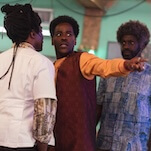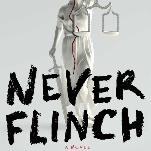Every episode of The Whispers opens with a child playing, sometimes alone, sometimes on the edge of a group, but always isolated. The credit sequence shows a series of unidentifiable children, some in shadow, some in silhouette, some turned away, all alone.
On its surface, The Whispers is about children. It’s about Henry Bennigan, who lost his hearing, then his father, and who’s grateful to the unseen entity promising to restore them both. It’s about Minx Lawrence, who manipulates friends and family with ease and is just as easily manipulated by Drill. It’s about Harper Weil, who tricks her mother into playing Drill’s game, not knowing he’ll use her mother’s injury to draw her even deeper into his game.
These children are alone despite their uniformly comfortable, affluent homes. They’re lonely, hungry for connection that their distracted parents don’t provide. Drill offers them that connection.
This could be poignant. The show could delve into that loneliness, exploring the emotional absence that leaves children susceptible to outside influence, tapping into both a fear common to parents everywhere and a familiar feeling from many viewers’ childhoods.
Instead, the children are largely props, wheeled in to set the plot in motion, then sent offstage. It’s a shame, because Kyle Harrison Breitkopf, Kylie Rogers, and Abby Ryder Fortson portray Henry, Minx, and Harper with a touching balance of sweetness, sorrow, and unself-consciousness, each injecting a glimmer of personality into the broadly drawn characters they play. And it’s doubly a shame that the adults are just as superficially drawn, despite valiant efforts from the actors.
The children of The Whispers long for connection, but the adults are enmeshed in it. It’s a preposterous web of connections: FBI agent Claire Bennigan uncovers a series of attacks carried out by children under instructions from the mysterious Drill. The chief suspect turns out to be Claire’s husband, Capt. Sean Bennigan, presumed dead when his plane disappeared. Claire’s former lover, DOD operative Wes Lawrence, leads the search for the missing pilot. At the moment Claire learns of Drill, Capt. Bennigan is in the same wing of the same hospital where Claire questions Harper, under the care Dr. Maria Benavidez (Catalina Denis), the same doctor treating Harper’s mother. Despite the obvious conflicts of interest, Claire continues to track her missing husband. Wes joins her, over the understandable objections of Lena Lawrence (Kristen Connolly), Les’ wife, and Alex Myers (Alan Ruck), Claire’s supervisor, who blames Wes for Claire’s distress.
Phew, what a tangle! This fictional version of Washington, D.C., must be a pretty small town. Either that or Drill isn’t worried about the adults—the professional investigators so familiar with each other’s lives—connecting the dots between their various children’s phantom friends.
And there’s no reason he should worry about it. From Wes Lawrence, who spares few words for his daughter even after he realizes she’s befriended their phantom suspect, to Claire Bennigan, who doesn’t follow up on the “really cool” new friend Henry’s so preoccupied with, to Minx’s child psychiatrist, who ignores all her non-verbal cues as well as her words, the adults of The Whispers are strikingly inattentive and self-centered.
Dr. Rosen (Adrian Hough) assures Lena Lawrence that her daughter knows Drill is imaginary, despite Minx’s obvious doubt. Her last word on the subject says it all. “I don’t think Drill’s going to like this.” She’s right. Drill doesn’t like it, and he ends Minx’s therapy as only Drill can: A child in the street during Dr. Rosen’s bike ride home sends him veering off into traffic.
The bystanders are curiously lax, too. You’d think a visit by a shaky-voiced FBI agent would put the staff of the bakery (and secret hawala) on guard, but no, they leave the rear security door unlocked, never noticing when Claire slips in to grill the woman working the kitchen. There, Claire learns the last thing she wants to hear: Sean’s been receiving illicit payments coinciding with a rash of attacks on national security personnel and their families.
Sean Bennigan continues to hold Maria Benavidez hostage, forcing her to chauffeur him to the site of his most recent vision, though it’s not clear why, even to him. She asks why he’s holding her, where they’re going, and he can only tell her, “I don’t know.” Though the FBI and DOD alert Harbor Point nuclear power plant that a suspected terrorist is on his way, they still take a ponderously long time for chitchat before they call in a malfunction of their security grid. (Kudos to the gas station clerk who clues in when Maria slips him Claire’s FBI business card. Unnamed shopkeep, you might be the most observant adult in this show’s world.)
Not even the ineffable can hold anyone’s attention for long. While agents race to the scene, Sean receives another message conveyed in the flickering fluorescents of the gas station restroom. (This show could more properly be called The Flickers.) Struggling to interpret his instructions, he shushes Dr. Benavidez… but only once, though she continues to talk over his very important mystical tidings.
At this point, it’s not clear whether The Whispers understands its own message. Sean Bennigan receives his orders just as Drill’s child proxies receive theirs, through flickers of lights and silent communication. Do his messages come from the same source? Though Claire’s associates presume his guilt, Sean seems destined to be Drill’s undoing, not his instrument, in which case there had better be a big revelation in the works explaining why his annunciations come in the same form as the children’s terrible instructions. Sadly, it seems the answer is that the children, who are so central to the plot, are treated as an afterthought.
In a scene set three months earlier, just before Sean’s disappearance, he and Claire fight about her affair with Wes. Both of them mention Henry, but he’s more like a pawn between them than a mutual concern. When Sean leaves—maybe for good—he slips into Henry’s room for a last lingering look at his son, but takes care not to wake him. This moment is for Sean, not for Henry.
In the present, Henry runs to greet Claire as she arrives home, asking, “Were you out chasing a bad guy?” She responds, “I hoped I wasn’t, but it turns out that’s exactly what I was doing.” That’s an opaque answer to give a kid who’s just asking about her day. In-universe, it’s a selfish answer. From the outside, it’s an answer that centralizes Claire’s feelings, not Henry’s.
Despite her reluctance to talk to “the lady who makes Mommy cry,” Minx reveals all the information Wes and Claire need to track Sean, even identifying his newest tattoo as the power plant’s logo… and she’s immediately shunted aside. Wes spares a moment as he and Claire move out to commune with his wife, but doesn’t say a word to Minx—not “goodbye,” not “thanks,” not “it’s going to be okay.”
There’s a rich dose of irony in adapting a story by Ray Bradbury, who wrote such loving reminiscences of bittersweet childhood longing and loneliness, and putting its focus on the adult dramas of illicit romances, marital strife, and professional rivalries. No one expects The Whispers to aspire to Bradbury’s nuance or poetry, but nothing in this show—not the children’s loneliness, not the failing marriages, not the cryptic threat—aspires to anything but slick, comfortable, vaguely mysterious pulp.
As they approach their unknown destination, Sean recognizes the landscape… or does he? “It’s like déjà vu,” he tells Maria. In one of the best lines of “Collision,” she shoots back, “It’s hard to have déjà vu when you’ve got no memories.” The Whispers is a bit like that. It’s both dully familiar in character and so general that it has little character of its own. It has no memory of its genre and is itself unmemorable.
Stray observations
- “Collision” marks the end of our weekly coverage of The Whispers. Thanks for reading!
- “Decisions are easy. It’s living with consequences that’s the hard part.” That’s the kind of flat, empty declaration that The Whispers specializes in.
- Wes overrides his wife’s objection to his lover questioning their child: “This might be our only chance to find out where Sean is.” Hey, Wes, “our only chance to prevent a terrorist attack that could kill us all” might be a smidge more persuasive.
- “I have the papers upstairs in my room.” Wait, why does an apparently noncorporeal entity need hard copies? And since he did need them, why does Minx still have them?








































